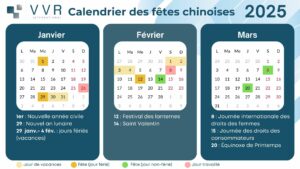The main traditional and commercial celebrations in China: holidays in 2025
China, with its thousand-year-old history, is a country where tradition and modernity coexist. Traditional festivals play a central role, combining ancestral rituals with family gatherings. Alongside these cultural celebrations, commercial festivals, often inspired by global trends or local initiatives, complete the calendar of key events. In 2025, several of these celebrations will give rise to specific public holidays or holiday periods, marking crucial moments in the daily lives of the Chinese people. In this article, we take a look at the most important traditional and commercial festivals in China, with details of the public holidays and dates to remember this year.
Traditional festivals: cultural and family pillars
Chinese New Year: from 29 January to 4 February 2025 (public holidays)
Chinese New Year, also known as the Spring Festival (春节 – Chūnjié), is the most important festival in China. Based on the lunar calendar, it falls in 2025 on Wednesday 29 January, ushering in the Year of the Snake. This period is synonymous with family reunions, abundant feasting and traditional rituals such as cleaning houses to chase away evil spirits and the famous fireworks display. The official public holidays run from 29 January to 4 February, although the festivities often last a fortnight.
Cultural anecdote :
Every year, millions of Chinese make massive moves across the country to reunite with their families. This phenomenon, known as Chunyun (春运), is the largest annual human migration in the world.
Lantern Festival: 12 February 2025
Bringing the Chinese New Year festivities to a close, the Lantern Festival (元宵节 – Yuánxiāo jié) takes place on 12 February 2025. On this day, colourful lanterns light up the streets, lion dances and parades are held, and traditional foods such as tangyuan (glutinous rice balls) are eaten.
Qingming Festival: 4 April 2025 (public holiday)
Also known as the Festival of the Dead (清明节 – Qīngmíng jié), this day is dedicated to remembering ancestors. Families visit the cemeteries to clean the graves and make offerings. In 2025, Qingming falls on Friday 4 April, providing an opportunity for an extended weekend.
Dragon Boat Festival: 31 May 2025 (public holiday)
This festival, celebrated on 31 May 2025, commemorates the poet Qu Yuan, an emblematic figure of ancient China. The programme includes dragon boat races, spectacular river competitions and zongzi (pyramids of glutinous rice wrapped in bamboo leaves). This day will be a public holiday, so you can make the most of the festivities.
Mid-Autumn Festival: 6 October 2025 (public holiday)
The Mid-Autumn Festival (中秋节 – Zhōngqiū jié), also known as the Moon Festival, is celebrated as a public holiday on 6 October 2025. Considered the second most important festival after Chinese New Year, it is marked by family gatherings to admire the full moon while enjoying mooncakes.
National Holiday: from 1 to 7 October 2025 (Golden Week)
National Day (国庆节 – Guóqìng jié), celebrated on 1 October, marks the creation of the People’s Republic of China in 1949. It gives rise to a week-long holiday known as Golden Week. This is a key period for tourism, both inside and outside the country.
Shopping festivals: between innovation and consumption
Singles’ Day: 11 November 2025
Known as Guanggun Jie (光棍节), Singles’ Day has become a global shopping phenomenon thanks to Alibaba. In 2025, this event, which falls on Tuesday 11 November, will once again be marked by record sales on online shopping platforms, attracting millions of shoppers in search of bargains.
The Double Twelve: 12 December 2025
Inspired by the success of 11 November, Double Twelfth (双十二) is a day of promotions, although not as intense as Singles’ Day. This day allows retailers to sell their remaining stock at attractive prices.
Chinese Valentine’s Day: 29 August 2025
Chinese Valentine’s Day, or Qixi (七夕节), falls on 29 August 2025. Inspired by a romantic legend between two lovers separated by the Milky Way, this holiday is increasingly embraced by the younger urban generations, who celebrate love with gifts and romantic dinners.
The organisation of public holidays in 2025: between work and rest
In 2025, public holidays in China follow a particular logic. In order to maximise rest periods, the authorities often adjust the weekends that precede or follow public holidays. For example, for Chinese New Year or Golden Week, working days may be moved to allow longer periods of leave. Here is a summary of public holidays in 2025:
- Lunar New Year: 29 January to 4 February
- Qingming: 4 April
- Labour Day: 1 May
- Dragon Boat Festival: 31 May
- Fête de la Mi-Automne and Fête Nationale combined: 1 to 7 October
Conclusion: a calendar rich in tradition and opportunity
Chinese festivals, whether traditional or commercial, punctuate daily life throughout the year. In 2025, they will offer not only moments of celebration and family gathering, but also opportunities for businesses and commerce to stand out from the crowd. Understanding these events is essential for anyone wishing to immerse themselves in Chinese culture or develop projects in this fascinating market.
Need advice on how to maximise your impact on the Chinese market? Contact VVR International! We’ll be delighted to help you with your projects in the Chinese market. contact@vvrinternational.com
Download our 2025 holiday calendar below:






